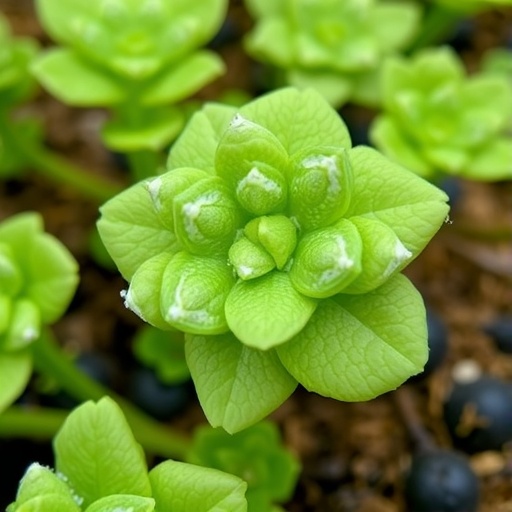In recent groundbreaking research, scholars have made significant strides in understanding the intricate effects of proline and thymine on the establishment of friable callus and cell suspension cultures of Dalbergia sissoo—commonly known as Indian Rosewood. This study provides the foundation for advancements in plant tissue culture, which holds immense promise for agricultural and ecological applications. The investigation focuses specifically on the nodal regions of over twenty-year-old trees, tapping into the genetic potential of mature plant sources that have been largely overlooked in similar studies.
Dalbergia sissoo is a species of great commercial value, especially in the wood industry, where its durable and attractive timber is sought after for furniture and flooring. Moreover, the species has ecological significance as it plays a crucial role in afforestation efforts and in providing habitats for various wildlife species. However, the challenges surrounding its propagation have led researchers to explore alternative methods that can overcome the limitations of traditional planting techniques. Thus, the focus on generating friable callus and cell suspension cultures is both timely and pertinent.
In the context of plant tissue culture, friable callus refers to a mass of undifferentiated cells that can be cultivated in vitro under controlled conditions. The establishment of a successful friable callus is a precursor for generating whole plants through regeneration processes. The researchers in this study have taken an innovative approach by examining how the addition of proline and thymine affects this important step in the culturing process. Proline, an amino acid involved in stress responses in plants, has been shown to enhance growth and development, while thymine, a nucleobase, serves critical roles in DNA synthesis.
The research highlights the methodology employed to establish these cultures. The nodal segments from Dalbergia sissoo were carefully excised and sterilized to prevent contamination. Afterward, they were placed in a culture medium enriched with varying concentrations of proline and thymine to assess their effects on callus formation. This meticulous approach not only underscores the technical aspects of tissue culture but also reflects the dedication of the researchers in achieving optimal growth conditions for the plant material.
One of the study’s key findings is the way in which proline levels in the culture medium influenced the rate of callus proliferation. The researchers observed that higher concentrations of proline led to an increase in cell division and growth, suggesting that this amino acid acts as a beneficial osmolyte. In contrast, lower concentrations did not yield favorable results, illustrating the importance of finding a balance in nutrient composition for effective culture establishment.
Moreover, thymine supplementation was shown to enhance regeneration rates. It is hypothesized that the presence of thymine supports the synthesis of vital cellular components necessary for growth, including nucleic acids and proteins. This interplay between proline and thymine suggests a synergistic relationship that could be leveraged for more efficient plant propagation techniques in Dalbergia sissoo.
The implications of this research extend beyond mere propagation techniques. By establishing successful cell suspension cultures, the researchers pave the way for further studies that investigate the genetic and biochemical properties of Dalbergia sissoo. Cell suspension cultures serve as a model system to explore gene expression and metabolic pathways, offering insights critical for the conservation and improvement of this valuable species.
Furthermore, the potential applications of the findings are profound. The ability to efficiently produce Dalbergia sissoo through tissue culture could facilitate large-scale reforestation efforts, vital for combating deforestation and promoting biodiversity. As global concerns regarding environmental sustainability continue to rise, such innovative techniques become essential tools in ecological restoration projects.
The research community is keenly observing the outcomes of this study, as the establishment of optimized tissue culture protocols could influence various aspects of plant biotechnology. The results add to the growing body of literature aimed at providing solutions for the sustainable use of non-timber forest products, contributing to economic growth while conserving natural ecosystems.
As we look towards the future of plant propagation, the advancements outlined in this study might encourage further explorations into the roles of various growth regulators and nutrient combinations in other economically important species. This could lead to breakthroughs not only in Dalbergia sissoo but also in countless other plants facing similar propagation challenges.
In conclusion, the research conducted by Rani, Yadav, and Thakur highlights the critical role of proline and thymine in enhancing the establishment of friable callus and cell suspension cultures of Dalbergia sissoo. By utilizing mature plant tissues from, the researchers explore novel avenues for tissue culture applications with significant ecological and economic impact. The broader implications of this research reinforce the significance of biotechnological advancements in promoting sustainable forestry practices and ensuring the viability of species crucial to our ecosystems.
Subject of Research: The impact of proline and thymine on callus and cell suspension culture establishment.
Article Title: Effect of proline and thymine on the establishment of friable callus and cell suspension culture of Dalbergia sissoo from the nodal region of over twenty-year-old trees.
Article References:
Rani, K., Yadav, S., Thakur, A. et al. Effect of proline and thymine on the establishment of friable callus and cell suspension culture of Dalbergia sissoo from the nodal region of over twenty-year-old trees. Discov. For. 1, 15 (2025). https://doi.org/10.1007/s44415-025-00015-2
Image Credits: AI Generated
DOI: 10.1007/s44415-025-00015-2
Keywords: Dalbergia sissoo, proline, thymine, friable callus, cell suspension culture, plant tissue culture, biotechnology, sustainable forestry.




